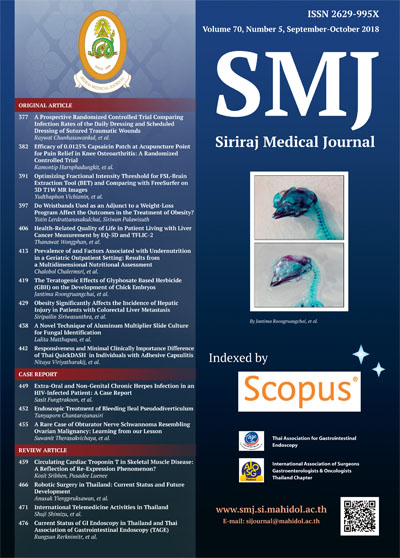Do Wristbands Used as an Adjunct to a Weight- Loss Program Affect the Outcomes in the Treatment of Obesity?
Keywords:
Wristband; obesity; lifestyle modification program; weight-loss program; body weight; waist circumference; habitAbstract
Objective: The purpose of the present study was to evaluate the efficacy of a wristband as a method for reminding
patients of lifestyle modification in weight-loss program.
Methods: Researchers randomly assigned 64 obese patients in our outpatient department to receive either a wristband
plus brief lifestyle modification program (wristband group) or a brief lifestyle modification program alone (control
group). The primary outcome was the change in body weight at 6 months. The secondary outcomes included the
change in body weight at 12 months; the change in waist circumference at 6 and 12 months; the percentage of
participants who maintained a weight loss at 6 and 12 months; and the categorical weight loss of the participants
at the 6- and 12-month follow-ups.
Results: At 6 months, participants in both groups had lost weight. The mean (±SE) weight change among the
participants in the wristband group and the control group was -4.5±1.38 and -2.13±1.09 kg, respectively (p-value
= 0.193). All of the secondary outcomes displayed a trend in favor of the wristband group.
Conclusion: The results of this trial of a weight-loss intervention provide potential
Downloads
Published
How to Cite
Issue
Section
License
Authors who publish with this journal agree to the following conditions:
Copyright Transfer
In submitting a manuscript, the authors acknowledge that the work will become the copyrighted property of Siriraj Medical Journal upon publication.
License
Articles are licensed under a Creative Commons Attribution-NonCommercial-NoDerivatives 4.0 International License (CC BY-NC-ND 4.0). This license allows for the sharing of the work for non-commercial purposes with proper attribution to the authors and the journal. However, it does not permit modifications or the creation of derivative works.
Sharing and Access
Authors are encouraged to share their article on their personal or institutional websites and through other non-commercial platforms. Doing so can increase readership and citations.











